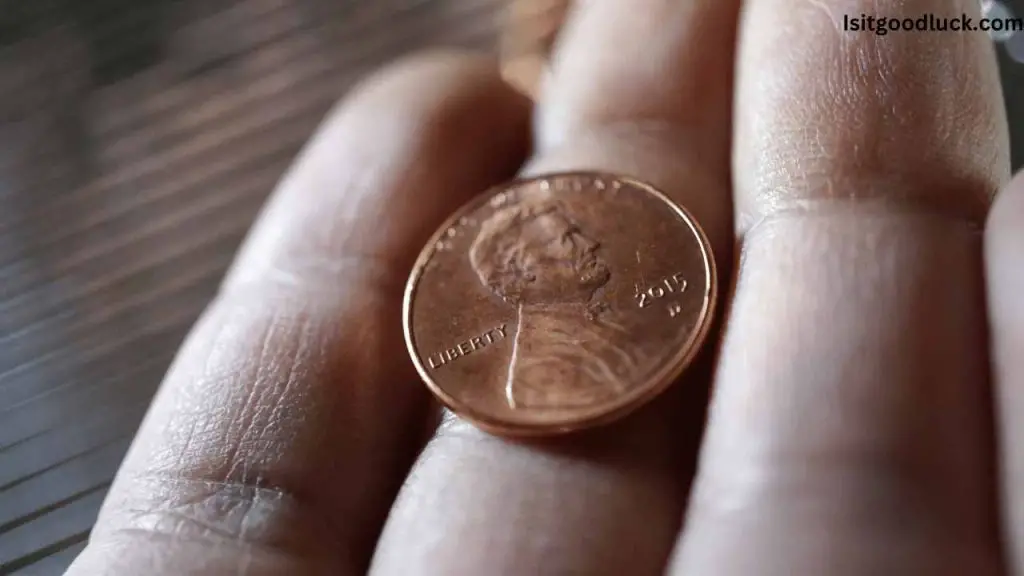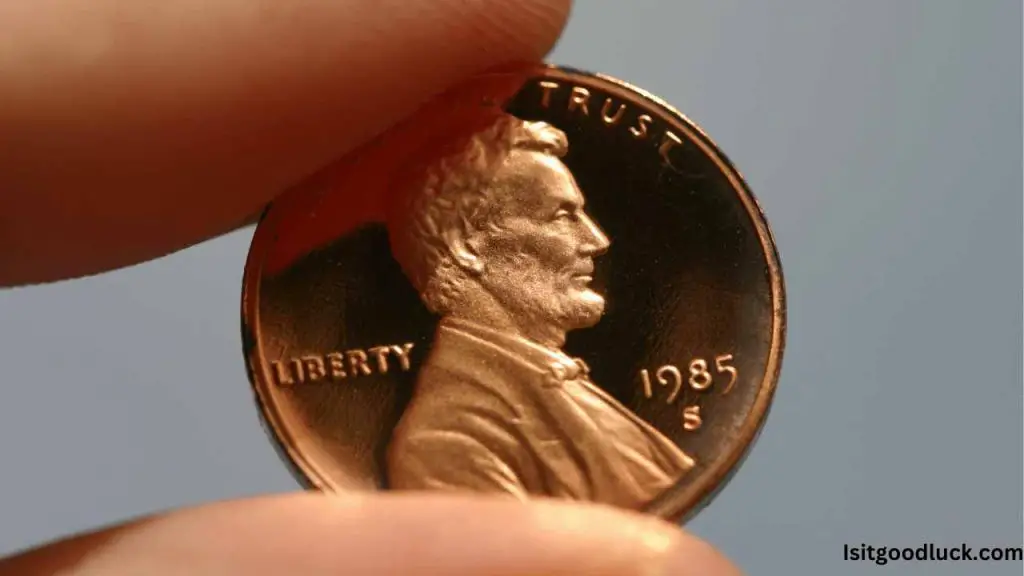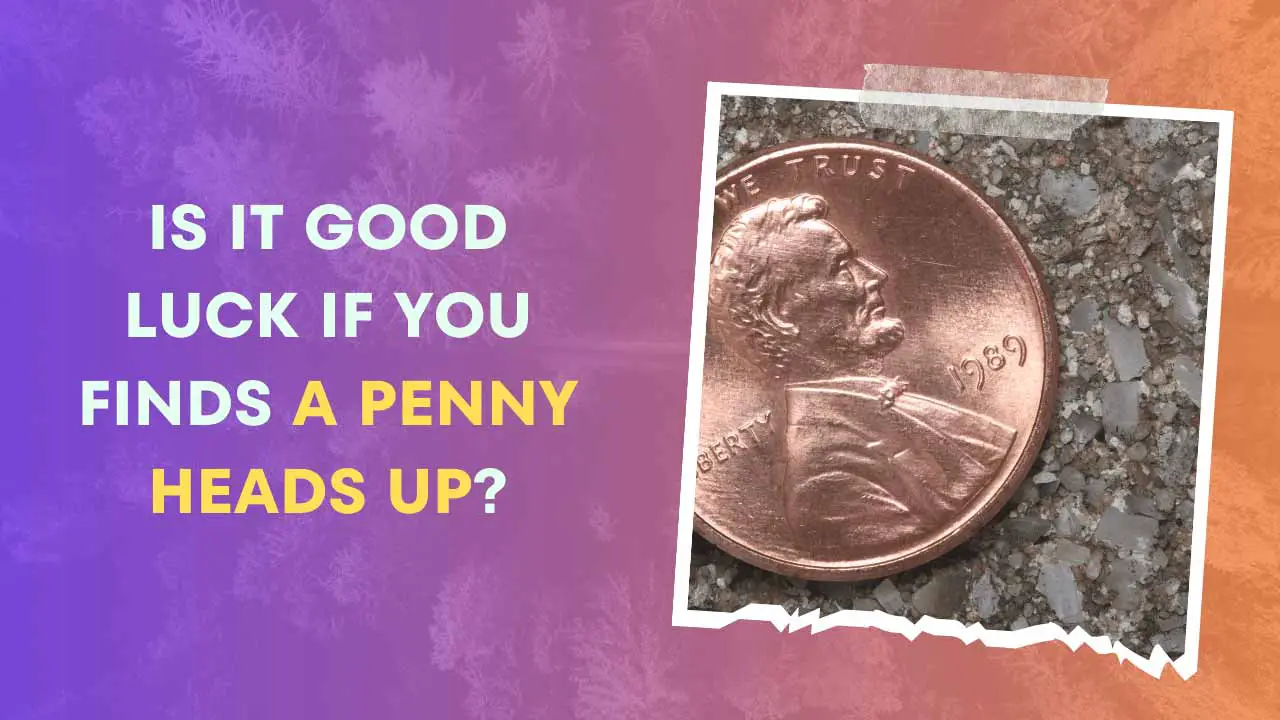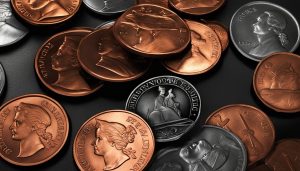When you’re strolling down the sidewalk, eyes wander as they take in the hustle and bustle of life, and then suddenly… there it is. A glittering copper coin is hiding among the gray concrete. A penny. You bend down to pick it up, and that’s when the age-old question pops up – is it good luck to find a penny heads up?
It’s a seemingly trivial question, yet it’s one that’s traveled through generations and continents, making its way into folklore and everyday superstitions alike.
In today’s blog post, we’re embarking on an exciting journey into the realm of myths, beliefs, and traditions, from Abraham Lincoln’s visage to the world of lucky charms.
We will delve into the mystery of the lucky penny and tackle the question on everyone’s lips: does finding a penny heads up bring good luck, or is it just another charming urban legend? Are there hidden layers to this belief?
Buckle up, dear readers, as we navigate the coin toss of fortune and seek answers to these enigmatic questions. Whether you believe in luck or a skeptic, we promise it will be a fascinating ride.
So, find your comfortable reading spot, ensure you’re not sitting on any loose change, and let’s embark on this coin-filled adventure together!
Contents
- 1 Is it good luck to find a penny heads-up?
- 2 The Origin of the Penny Luck Superstition:
- 3 Psychological Aspects of Good Luck Charms:
- 4 How to Use a Lucky Penny:
- 5 Conclusion:
- 6 FAQs
- 6.1 Does the year on a penny influence its luck?
- 6.2 Are pennies from different countries also considered lucky when found heads up?
- 6.3 If I find a penny tails up and flip it to heads up, will it still bring good luck?
- 6.4 What do I do if I find a penny heads up but don’t want to pick it up for hygienic reasons?
- 6.5 Does the superstition apply to other coins or just pennies?
Is it good luck to find a penny heads-up?
Suppose you’re out on a leisurely walk, the sun warming your skin, the wind rustling the leaves, when something shiny catches your eye. There, hidden amongst the trail-side pebbles, lies a solitary penny.
You’re about to reach for this tiny treasure when you notice its tails up. A quick rush of thoughts and you’re grappling with the question, “Should I pick it up, or should I leave it?” A voice from your childhood echoes the lore: A penny heads up brings good luck, a penny tails up… not so much.
This age-old belief ingrained in our minds has given pennies a charisma far beyond their monetary value.
According to folklore, a penny found heads up is a lucky find, a little sprinkle of luck in your day. The universe is winking at you, offering a token of good fortune – free for the taking, no strings attached. It’s a momentary connection with the divine, a secret handshake between you and Lady Luck herself.
On the other hand, spotting a penny tails up stirs up a different, slightly less optimistic narrative. Folklore urges us to leave it be, as though the coin flipped onto its unlucky side, and we’re better off not tempting fate.
Despite having the potential to increase our wealth by a tiny fraction, this penny is viewed as a bearer of ill-omen, a sign that Lady Luck has momentarily turned her gaze away.
It’s fascinating, isn’t it? How a simple flip can transform a humble penny from a beacon of good fortune to a precursor of unluckiness.
Whether you’re a staunch believer, a curious observer, or a playful participant, these tales remind us of the enduring charm of folklore and the human tendency to seek meaning in the seemingly mundane.
So the next time you find a penny, take note – is it heads or tails? And more importantly, what will you choose to do?
Also read: Is It Good Luck to Find Money on the Ground?

The Origin of the Penny Luck Superstition:
Let’s turn back the hands of time and delve into the captivating history of pennies and their deep-rooted symbolism. A penny might seem like the most insignificant coin, a whisper of currency many overlook.
However, in the past, the humble penny held much more clout. In medieval times, you could get a whole loaf of bread for a penny! Even the coin’s composition, with copper associated with the goddess Venus in Roman mythology, lent it a sense of divinity and importance.
The symbolism of pennies and other coins stretches back even further. Ancient cultures often associated coins with wealth, prosperity, and protection. From ancient Roman coins depicting Fortuna, the goddess of fortune, to Chinese coins tied with red ribbons to attract wealth and luck, these tiny metallic pieces have long held a special place in the human psyche.
So, when and how did the ‘heads up’ aspect weave into the tapestry of penny lore? As with many superstitions, pinpointing the exact origin can be tricky. However, one popular theory traces it back to ancient Roman times.
The Romans believed that anything containing a likeness or representation of the human form contained a spirit, and that spirit could aid or hinder them. When they flipped a coin, they believed the outcome was the gods’ decision.
Thus, the notion that the face side of the coin (or ‘heads’) brought divine favor and, subsequently, good luck might have taken root.
It’s remarkable, isn’t it? The centuries-old journey of the penny from being a bread-buying currency to a symbol of luck, all depending on which side is up!
As we travel through this blog post, remember that every penny you’ve ever found carries a fragment of this rich history and symbolism within its humble copper facade.
Next time you come across one, whether it’s heads or tails, take a moment to appreciate this little token of our shared human past.

Psychological Aspects of Good Luck Charms:
Luck and superstition often go hand in hand in the tapestry of human psychology, don’t they? We find ourselves fascinated by fortune cookies, star signs, and, yes, even pennies found heads up on the sidewalk.
But have you ever stopped to wonder why we attribute meanings to these seemingly random events? The answer lies in the heart of human psychology.
As humans, we are pattern-seekers. We love connecting the dots, even when there might not be any dots to connect. It’s part of our survival instinct. By assigning meaning to random events, we try to make sense of the world around us to tame the randomness of life.
Picking up a heads-up penny and attributing it to a stroke of good luck is a classic example of this pattern-seeking behavior.
Enter the placebo effect, a phenomenon usually associated with medicine, where a harmless substance produces a beneficial health outcome simply because the individual believes it will. This psychological quirk isn’t limited to health but also to lucky charms.
Carrying that lucky penny in your pocket could make you feel more confident and optimistic simply because you believe it brings good luck. It’s like a little cheerleader, quietly egging you on from your pocket.
Believing in good luck can also significantly influence our mindset and actions. This belief often leads to positive thinking, a sense of optimism, and an expectation of favorable outcomes. In essence, the idea of good luck can work as a self-fulfilling prophecy.
When we believe we’re lucky, we’re more likely to take risks, seize opportunities, and, in turn, we may find more success.
So, the next time you spot a penny heads up, and your heart leaps with the promise of good luck, remember that it’s not just the penny working its magic.
It’s also the remarkable power of your mind, assigning meaning, instilling confidence, and urging you toward potential success. So why not pick up that penny and let the charm do its work?
How to Use a Lucky Penny:
So you’ve found your shiny little talisman, a penny heads up, and you’re now the proud holder of a token of good fortune. The question is, what do you do with it? Well, as it turns out, there are plenty of fun and light-hearted ways to use your lucky penny. Let’s explore some of them.
You could start by making it your secret weapon. Yes, you heard it right! Tuck it away in your wallet, purse, or the small pocket of your jeans, and let it be your silent partner, instilling confidence and optimism as you navigate your day.
Or how about turning it into a piece of jewelry? A penny pendant, perhaps? It’s a creative and stylish way to keep your luck close to your heart. Literally.
Your lucky penny could serve as a unique bookmark for the bibliophiles out there. Let good fortune mark your literary adventures, page by page.
You might also consider creating a luck jar at home. Each time you find a lucky penny, add it to the jar. Over time, you’ll have a physical representation of all the luck you’ve accumulated. Plus, it makes for a great conversation starter when guests are over!
People worldwide have found ingenious ways to store, carry, or display their lucky pennies, from embedding them in keychains to sticking them on vision boards.
It’s all about letting that tiny coin play its role, reminding you of the little dash of luck it brings, and spicing up your day with magic and positivity.
So, no matter how you choose to use your lucky penny, remember that its true power lies in the joy, hope, and positive outlook it instills. Whether in your pocket or around your neck, let your lucky penny symbolize the good fortune you carry with you every day.
Conclusion:
As we round off this coin-filled journey, it’s clear that the answer to our initial question – “Is it good luck to find a penny heads up?” – isn’t as simple as heads or tails. Instead, it’s as complex and layered as the rich history and human psychology we’ve explored together.
We’ve learned that the power of the penny – heads up or tails up – lies less in its copper-clad body and more in our minds, our beliefs, and the narratives we weave around it. It is a symbol that carries with it a fascinating blend of history, mythology, human nature, and cultural beliefs that far outweigh its monetary worth.
Finding a penny heads up might not dramatically alter the course of your destiny, but it sure does add a sprinkle of magic to your day, a little nudge of optimism that reminds you to stay hopeful.
It serves as a token of good luck that stirs up childhood memories, ignites our natural curiosity, and offers us a chance to connect with the vast tapestry of human beliefs and traditions.
In the end, perhaps the luckiest thing about finding a penny heads up is the delightful pause it gives us, the moment we stop, smile, and embrace the charm of life’s simple surprises.
So, next time you spot that glint of copper on your path, don’t just walk by. Stop, pick it up, and let yourself be a part of the extraordinary story of the lucky penny.
We hope you’ve enjoyed this exploration as much as we’ve enjoyed crafting it for you. So, here’s wishing you many lucky pennies in your future – and remember, whether they bring good fortune or not, the true magic lies in the journey of discovery and the stories we share. Happy penny hunting!
Also read other articles regarding finding objects good luck
FAQs
Does the year on a penny influence its luck?
While some people might believe that a penny from a specific year brings more luck (like the year of their birth or a significant life event), there’s no widely-held superstition that links the luck of a penny to its minting year. The luck attributed to a penny generally stems from finding it in a heads-up position, regardless of the year it was made.
Are pennies from different countries also considered lucky when found heads up?
The superstition about finding a penny heads-up tends to be more prevalent in countries that use pennies, like the United States and the United Kingdom. However, the concept of coins bringing good luck when found is common in many cultures worldwide. The specifics of the superstition might vary, so it would be fascinating to research local beliefs if you find a coin from another country!
If I find a penny tails up and flip it to heads up, will it still bring good luck?
Superstitions are deeply personal, and how you interpret this situation may depend on your beliefs. Some might argue that flipping the penny yourself could still bring good luck, as it’s now heads up. Others may contend that the initial finding of the penny tails up might negate the luck. Ultimately, it’s really up to you and your interpretation of the superstition.
What do I do if I find a penny heads up but don’t want to pick it up for hygienic reasons?
If you’re worried about hygiene but still want to acknowledge the lucky find, you might consider taking a photo of the penny or just noting the moment in another way. The essence of the superstition lies in the encounter with the lucky penny, not necessarily in physically possessing it.
Does the superstition apply to other coins or just pennies?
While superstition is most commonly associated with pennies, likely due to their prevalence and distinct two-sided design, some people extend similar beliefs to other coins. The exact nature of coin-related superstitions varies widely between cultures and individual beliefs.






